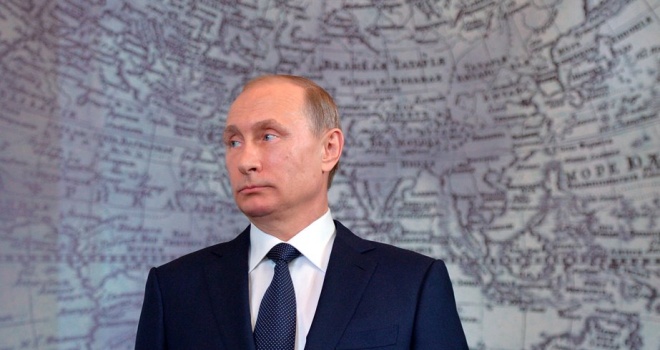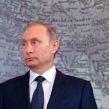
Putin’s Political Pause Amid National Mobilization
Publication: Eurasia Daily Monitor Volume: 12 Issue: 83
By:

As if trying to compensate for his recent “disappearance” in early March, President Vladimir Putin participated in a series of high-intensity meetings and public events last week. His domestic audiences included students and “heroes of labor”; instructions were issued to government ministers, members of the Security Council and even to the Russian Geographic Society. Indeed, the presidential activities completely dominated news coverage in the official TV channels. The main message of all these accentuated efforts at executing leadership was a plain demonstration of Putin’s undiminished capacity for his trademark “manual management” of micro-problems important to “ordinary Russians” (Ezhednevny Zhurnal, May 1). The Kremlin spin-doctors probably saw the need to deliver this message before the traditional spring break, when the urban dwellers flock to their dachas and temporarily escape the reach of propaganda (Gazeta.ru, April 29). The Kremlin has a growing need to keep the country mobilized around Putin’s agenda, which, in essence, consists of asserting his monopoly on power while he postpones key political decisions (Slon.ru, April 28).
This procrastination is most obvious in economic crisis management as Putin redoubles his efforts to reassure Russians of the “inevitable” recovery stimulated by the relative stabilization of the ruble (Newtimes.ru, April 27). Massive expenditure of accumulated financial reserves has provided a measure of buoyancy to the national currency, but investment activity remains severely depressed. Current macro-economic indicators show a deeper GDP decline than the worst government estimate, and experts argue mostly about the depth of forthcoming contractions (Rbc.ru, April 29). The political elites tend to assume that the fall in real incomes is insignificant against the background of “patriotic unity,” but the steady increase in strikes and other economic protests shows a different picture (Gazeta.ru, May 1). No amount of official optimism can dispel the impressions supplied by daily economic interactions; instead, the smart combination of denials and explanations only confirms that the government cannot produce any coherent plan for overcoming crisis that would fit with Putin’s anti-liberal mindset (Forbes.ru, April 28).
It is quite remarkable that, in the deluge of reassuring rhetoric, Putin carefully avoids several topics that are attracting plenty of debates in the limited public space left for such exercises. One example is the irreversible degeneration of the space industry: Though it has manifested itself in the recent failure to deliver the transport vehicle “Progress” to the International Space Station, this degeneration involves a wide range of organizational and financial problems, including the serious delay with the construction of the Vostochny launch site in the Far East (Slon.ru, April 30). Another shunned topic is the legal case against Gazprom filed by the European Commission, which can only be settled if the Russian “gas champion” would change its monopolistic ways in the EU market (Carnegie.ru, April 26). Perhaps the most conspicuous theme for Putin’s silence is the developing feud between Chechnya’s despotic ruler Ramzan Kadyrov and the heavy-weight siloviki (security services personnel) from the Ministry of Interior and the Federal Security Service (FSB), in which the brutal murder of Boris Nemtsov two months ago is just a means to an end of redistributing financial flows and power resources (Polit.ru, April 30).
This clash is merely a symptom of profound disorganization within Putin’s system of power, which is encountering challenges beyond its ability to keep going by appropriating petro-rents and faking loyalty. State corporations, instead of donating cash to good political causes, demand budget funding for covering their mounting losses. Meanwhile, regional governors construct financial pyramids of unpaid taxes and bad debts (Carnegie.ru, April 14). Putin’s pause does nothing for disciplining the over-grown state apparatus, which cannot change its predatory ways and shrugs off an occasional dismissal of a governor for inordinate thievery as indifferently as it responds to the instruction that a governor’s salary should not be several times higher than the average for the respective region (Kommersant, April 29). The president’s reassuring rhetoric (such as: “I would not even call it a crisis—we have certain developments and complications”) (Kremlin.ru, April 28) apparently rings hollow for the army of corrupt bureaucrats who keep evacuating their fortunes abroad.
The only workable instrument of Putin’s policy is, in fact, war. And despite his moderate remarks about Moscow’s dialogue with the Kyiv government, the official propaganda keeps fanning the hatred generated by the already painful traumas in Russian society inflicted by the “hybrid war” (Novaya Gazeta, April 28). Putin had a telephone conference with German Chancellor Angela Merkel, French President Francois Hollande and Ukrainian President Petro Poroshenko last Thursday (April 30), and confirmed his commitment to the full implementation of the Minsk agreements (Kommersant, April 30). Fresh ceasefire violations immediately multiplied after that peace-making conversation, and heavy Russian artillery has moved back toward positions within the effective fire range (Newsru.com, May 3). Russian mainstream media gloats over the futility of the Ukraine–European Union summit in Kyiv last week and spins all sorts of speculations regarding the deployment of 300 US personnel from the 173rd Airborne Brigade to Lviv oblast for training several battalions of the Ukrainian National Guard (Rossiiskaya Gazeta, April 27).
The focal point for the “patriotic” propaganda for the last several months has been the celebration of the 70th anniversary of the Soviet Union’s victory in the Great Patriotic War (as World War II is known in Russia), which is now just a few days away. Reflections on the horrible costs of that bitter victory or on coalition efforts with the Allies have been nearly nonexistent; instead, jingoistic triumphalism, combined with the traditional display of military might, translates into an eager anticipation of yet another victorious campaign. Putin has invested a lot of personal effort in turning this celebration into a demonstration of Russia’s prominent position in the international arena, and now has to swallow not only the fruits of isolation but also the consequences of progressing economic feebleness. The artificially induced moment of national unity will likely dissipate with unpredictable speed in the weeks to come, so his window for a new morale-boosting aggressive action may turn out to be quite narrow.




